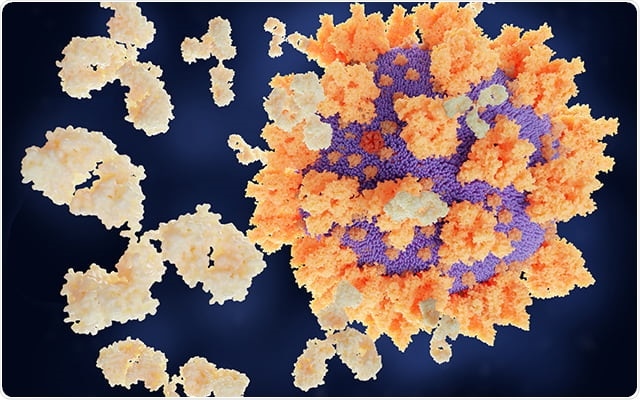While neutralizing antibodies form in less than two weeks of a COVID-19 infection, their intensity and durability can differ from one individual to another, raising concerns about the possibilities of the efficacy of COVID-19 vaccines and long-lasting immunity.

An artist’s rendering of a SARS-CoV-2 viral particle and binding antibodies. Image Credit: Juan Gaertner/Science Photo Library/Getty Images.
In the PLOS ONE journal, which was published online on February 11th, 2021, scientists from the University of California San Diego School of Medicine have reported that people’s immune response to SARS-CoV-2—the virus that is responsible for causing the COVID-19 infection—may be restricted by the key histocompatibility complex or MHC—a series of variable genes that code for cell surface proteins crucial for the adaptive immune system.
In particular, senior authors of the study Maurizio Zanetti, MD, a professor of medicine, Hannah Carter, Ph.D., an associate professor of medicine, and collaborators analyzed how the MHC communicates with two forms of immune cells or lymphocytes, known as T and B.
The immune system responds to invading pathogens by producing antibodies aimed at intercepting and neutralizing the pathogen. The production of antibodies against proteins requires productive cooperation between the T lymphocyte and the B lymphocyte, which must both recognize adjacent antigen sequences initiated by the MHC on B cells.”
Maurizio Zanetti, MD, Study Senior Author and Professor of Medicine, University of California, San Diego
Zanetti continued, “Peptide sequences in close proximity engage the two cells preferentially and non-randomly. The MHC serves as the link between the T and B lymphocytes in this process.”
On the basis of this reasoning, the team computationally examined all the potential fragments of the spike protein, called RBM, which acts as a trigger for vaccine activity and the human immune response, in association with over 5,000 various MHC molecules denoted in the global human population.
To their amazement, the researchers discovered that the average tendency of the MHC to exhibit RBD-derived peptides is low. Since MHC binding happens to be an indirect measure of the possibility that the T cell will be stimulated and the B lymphocyte will be triggered to produce antibodies against the RBM spike protein, it follows that the production of RBM-specific antibodies could be impeded by the substandard fitting of these parts of the virus to the MHC, the researchers stated.
This then could lead to poorer neutralizing antibody responses. And in the case of SARS-CoV-2, the poor presentation of key RBD fragments by many MHC alleles could stand as an obstacle to the production of neutralizing antibodies targeting the RBM.”
Andrea Castro, Study First Author, University of California - San Diego
Castro is also a member of Carter’s laboratory.
The researchers proposed that the immunological history of people may play a crucial role in T cell response and the following activation of B lymphocytes that can generate powerfully targeted neutralizing antibodies.
According to Carter, the potential implications of the analysis are twofold.
Carter added, “One is that the ability to generate antibodies with potent neutralization activity may vary considerably from individual to individual within the general population, reflecting the large genetic diversity of the MHC. The other is that lack of effective cooperation between T and B lymphocytes may affect the longevity of neutralizing antibody responses in infected people.”
The authors observed that numerous studies have already reported that neutralizing antibodies in infected individuals (health care workers, hospitalized patients, and convalescent persons) fall within three months.
To these considerations, one may add the impact of the newly discovered mutations in the RBM, such as those in the UK, South Africa, and Brazilian variants of the virus.”
Maurizio Zanetti, MD, Study Senior Author and Professor of Medicine, University of California, San Diego
“The topology of the mutations in these new variants is indicative of a further potential breakdown of the immunological relay between T and B lymphocytes, with an additional negative impact on the ability of individuals in the global population to generate high quality and long-lived neutralizing antibody responses against SARS-CoV-2,” Zanetti concluded.
Source:
Journal reference:
Castro, A., et al. (2021) In silico analysis suggests less effective MHC-II presentation of SARS-CoV-2 RBM peptides: Implication for neutralizing antibody responses. PLOS ONE. doi.org/10.1371/journal.pone.0246731.